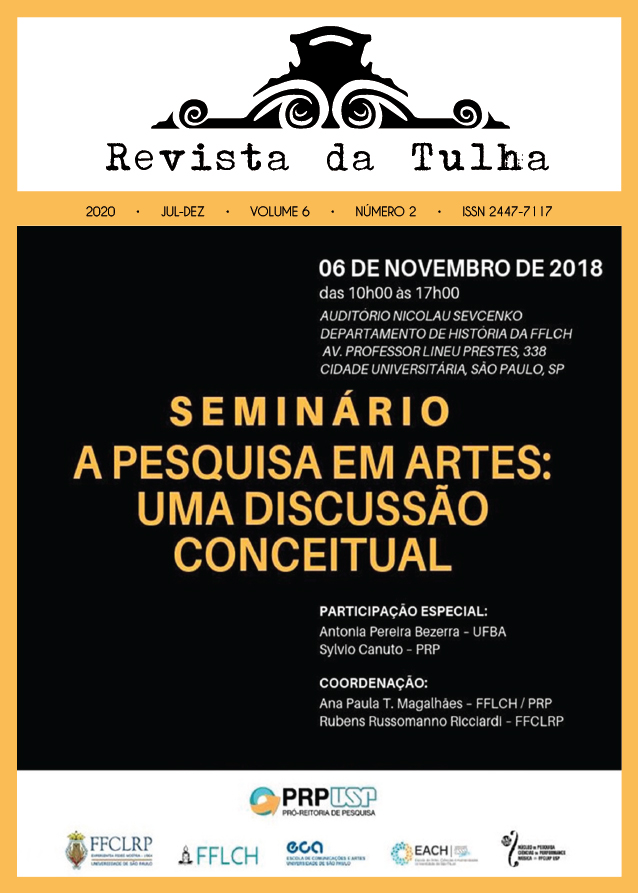The adoption of an interdisciplinary syllabus in education and in the study of the erudite and popular cultures in the brazilian context
DOI:
https://doi.org/10.11606/issn.2447-7117.rt.2020.178044Keywords:
Interdisciplinarity, A-historical conception, Historical-dialectical conception, Interdisciplinary syllabus, Musical productionAbstract
The present text analyses the two conceptions of interdisciplinarity – the a-historical conception and the dialectic historical conception, both in the sciences and in education. Under this perspective, the interdisciplinary syllabuses will be assessed with the purpose of minimizing the epistemological fragmentation that was established after the Cartesianism. In this sense, in an integrated way, the education supervisors must present interdisciplinary syllabus proposals focused on three epistemological dimensions - the ethical, cultural and social dimensions. The reports hereby produced are basically founded in the works of M. F. Gomes da Silva (2009) and A. C. Lopes and E. Macedo (org) (2005). The text culminates with the analysis of E. Fubini, among other musicologists, pointing out the epistemological isolation present in the contemporary musical production, which confirms a fragmented and hyper-specialized musical practice, in the opposite way of a hybrid cultural pattern set up in the contemporary society.
Downloads
References
ARANTES, Antonio Augusto. O que é cultura popular. 1981. 14 ed. São Paulo: Brasiliense, 1990.
COSTA, Marisa Vorraber. Poder, discurso e política cultural: contribuições dos estudos culturais ao campo do currículo. In: LOPES, Alice Casimiro & MACEDO, Elizabeth (orgs). Currículo: debates contemporâneos, 2ª edição, São Paulo: Cortez Editora, 2005.
DUSSEL, Inés. O currículo híbrido: domesticação ou pluralização das diferenças? In: LOPES, Alice Casimiro & MACEDO, Elizabeth (orgs). Currículo: debates contemporâneos, 2ª edição, São Paulo: Cortez Editora, 2005.
FUBINI, Enrico. Música y linguaje en la estética contemporánea. Espanha: Alianza Música, 2001.
GOMES DA SILVA, Maria de Fátima. Para uma ressignificação da interdisciplinaridade na gestão dos currículos em Portugal e no Brasil. Portugal - Coimbra: Fundação Calouste Gulbenkian, 2009, 617, p.
LEITE, Carlinda. O lugar da escola e do currículo na construção de uma educação intercultural. In: CANEN, Ana e MOREIRA, Antonio Flavio Barbosa (orgs). Ênfases e omissões no currículo. Campinas, SP: Papirus, 2001, p. 45-64.
LENOIR, Yves. Didática e interdisciplinaridade: uma complementaridade necessária e controlável. In. FAZENDA, Ivani C. Arantes (org). Didática e Interdisciplinaridade. Campinas, SP: Papirus, p. 45-75, 1998.
SANTAELLA, Lúcia. (Arte) & (cultura): equívocos do elitismo. 2. ed. São Paulo: Cortez, 1990.
SILVA, Maria de Fátima Gomes da. Para uma ressignificação da interdisciplinaridade na gestão dos currículos em Portugal e no Brasil. Portugal Edição Fundação Calouste Gulbenkian, Fundação para a Ciência e Tecnologia. 2009.
SLOBODA, John A. A mente musical: a psicologia cognitiva da música. Tradução de Beatriz ilari e Rodolfo Ilari. Londrina:EDUEL, 2008.
TURA, Maria de Lourdes Rangel. Conhecimentos escolares e a circularidade entre culturas. In. In: LOPES, Alice Casimiro & MACEDO, Elizabeth (orgs). Currículo: debates contemporâneos, 2ª edição, São Paulo: Cortez Editora, 2005, p. 150 a 173.
Downloads
Published
Issue
Section
License
Copyright (c) 2020 Sonia Regina Albano de Lima

This work is licensed under a Creative Commons Attribution 4.0 International License.
Authors retain copyright and grant the journal the right to first publication, with the work licensed under the Creative Commons Attribution License CC-BY-NC:
This work is licensed under a Creative Commons Attribution 4.0 International License.



